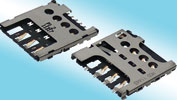

Since the introduction of the subscriber identification module (SIM) card technology, the size of smartcards has greatly shrunk to pack more on-chip memory for provider applications; increased security, control and data processing functions; and to fit newer but smaller future devices.
The migration of developing markets from 2G and older networks to advanced SIM-based 3G networks led to the development of a new SIM card format that enabled smartphones, tablet PCs or other devices to transfer digital photos and huge data files over high-speed 3G networks. This format is known as 3FF (3rd form factor), Mini-UICC (Universal Integrated Circuit Card) or more popularly as micro-SIM.
Measuring only 12 by 15 mm, the micro-SIM card is 52% smaller than its 15 by 25 mm predecessor, the Mini-SIM (or 2FF) card. It retains the same electric contacts and circuitry of previous SIM cards, has added functionality and is backward compatible with larger SIM card holders and readers via additional surrounding plastic cut-outs.
Ideal for ultra-slim smartphones, tablet PCs, GSM/UMTS modems, PC cards, WLAN (wireless LAN) cards, as well as machine-to-machine (M2M) systems, Molex’s micro-SIM card sockets are developed for PCB real estate and vertical space savings.
A distinguishing feature of Molex’s micro-SIM card sockets is their built-in anti-short design. The risk of electrical shorting is particularly high when users of larger SIM cards attempt to force-fit these into the shape of a micro-SIM card by trimming around the plastic edges of the contact pads (the actual working area of all SIM cards). This may leave the pared SIM card with an exposed pad which may potentially cause shorts with all other contact pads when inserted into the metal socket.
Shorting is prevented in Molex’s series 78646 socket by a shell design feature that confines any lateral movements of the SIM card when inserted, even if improperly cut. The series 78727 socket has raised plastic walls that act as contact barriers to insulate the pads of the inserted SIM card from the metal shell of the socket.
The socket also has a card polarisation feature to prevent the card from being inserted in the wrong direction; and a detect switch to enable card detection when fully inserted. The sockets’ round contact terminals provide excellent electrical contact; their reverse terminal design with gradual lead-in enables smooth card insertion and withdrawal.
The sockets have LCP housings that can withstand high temperatures and feature wide ‘finger’ areas for push-pull actions on the SIM card. Available in 6-or 8-circuit options, these sockets are ELV- and RoHS-certified.

© Technews Publishing (Pty) Ltd | All Rights Reserved